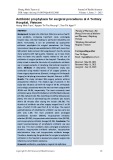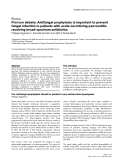
Antibiotic prophylaxis
-
Surgical site infections (SSIs) are serious health care problems, increasing treatment costs, prolonging hospital stay, and even leading to permanent disability and death. Fortunately, it can be prevented by appropriate antibiotic prophylaxis for surgical procedures.
 11p
11p  vibecca
vibecca
 01-10-2024
01-10-2024
 5
5
 2
2
 Download
Download
-
To describe the situation, serotype distribution and some related factors of group B streptococcal infection during 35 – 37 weeks of pregnancy at Nghe An Maternity Hospital, 2018-2019.
 15p
15p  gaocaolon7
gaocaolon7
 18-09-2020
18-09-2020
 75
75
 2
2
 Download
Download
-
Tuyển tập các báo cáo nghiên cứu về y học được đăng trên tạp chí y học Critical Care giúp cho các bạn có thêm kiến thức về ngành y học đề tài: Pro/con debate: Antifungal prophylaxis is important to prevent fungal infection in patients with acute necrotizing pancreatitis receiving broad-spectrum antibiotics...
 4p
4p  coxanh_3
coxanh_3
 25-10-2011
25-10-2011
 70
70
 6
6
 Download
Download
-
Distribution To be effective, concentrations of an antibacterial agent must exceed the pathogen's MIC. Serum antibiotic concentrations usually exceed the MIC for susceptible bacteria, but since most infections are extravascular, the antibiotic must also distribute to the site of the infection. Concentrations of most antibacterial agents in interstitial fluid are similar to free-drug concentrations in serum.
 6p
6p  colgate_colgate
colgate_colgate
 21-12-2010
21-12-2010
 72
72
 3
3
 Download
Download
-
Rifampin Bacteria rapidly become resistant to rifampin by developing mutations in the B subunit of RNA polymerase that render the enzyme unable to bind the antibiotic. The rapid selection of resistant mutants is the major limitation to the use of this antibiotic against otherwise-susceptible staphylococci and requires that the drug be used in combination with another antistaphylococcal agent. Linezolid Enterococci, streptococci, and staphylococci become resistant to linezolid in vitro by mutation of the 23S rRNA binding site. Clinical isolates of E. faecium and E.
 5p
5p  colgate_colgate
colgate_colgate
 21-12-2010
21-12-2010
 69
69
 3
3
 Download
Download
-
Antibiotic prophylaxis, if 100% effective, likely prevents only a small number of cases of endocarditis; nevertheless, it is possible that rare cases are prevented. Weighing the potential benefits, potential adverse events, and costs associated with antibiotic prophylaxis, the expert committee of the American Heart Association has dramatically restricted the recommendations for antibiotic prophylaxis. Prophylactic antibiotics (Table 118-7) are advised only for those patients at highest risk for severe morbidity or death from endocarditis (Table 1188).
 7p
7p  thanhongan
thanhongan
 07-12-2010
07-12-2010
 70
70
 4
4
 Download
Download
-
Gastrointestinal Illness Decreased levels of gastric acid, abnormal gastrointestinal mucosal immunity, other complications of HIV infection, and medications taken by HIVinfected patients make travelers' diarrhea especially problematic in these individuals. Travelers' diarrhea is likely to occur more frequently, be more severe, be accompanied by bacteremia, and be more difficult to treat. Although uncommon, Cryptosporidium, Isospora belli, and Microsporidium infections are associated with increased morbidity and mortality in AIDS patients.
 5p
5p  thanhongan
thanhongan
 07-12-2010
07-12-2010
 92
92
 5
5
 Download
Download
-
The level of suspicion of infections with certain organisms should depend on the type of cancer diagnosed (Table 82-3). Diagnosis of multiple myeloma or CLL should alert the clinician to the possibility of hypogammaglobulinemia. While immunoglobulin replacement therapy can be effective, in most cases prophylactic antibiotics are a cheaper, more convenient method of eliminating bacterial infections in CLL patients with hypogammaglobulinemia.
 5p
5p  konheokonmummim
konheokonmummim
 03-12-2010
03-12-2010
 80
80
 5
5
 Download
Download
-
A similar problem can affect patients whose lymph node integrity has been disrupted by radical surgery, particularly patients who have had radical node dissections. A common clinical problem following radical mastectomy is the development of cellulitis (usually caused by streptococci or staphylococci) because of lymphedema and/or inadequate lymph drainage. In most cases, this problem can be addressed by local measures designed to prevent fluid accumulation and breaks in the skin, but antibiotic prophylaxis has been necessary in refractory cases.
 6p
6p  konheokonmummim
konheokonmummim
 03-12-2010
03-12-2010
 66
66
 4
4
 Download
Download
CHỦ ĐỀ BẠN MUỐN TÌM





















